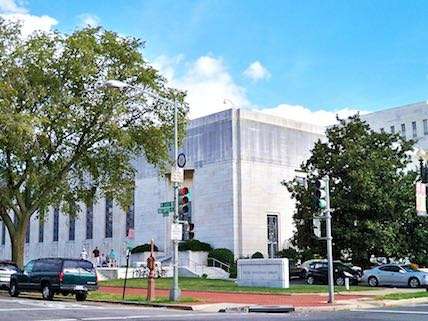Student Expelled for Rape Says Amherst Discriminates Against Men, Court Says He's Got a Point
Male student had evidence he was the victim of sexual assault, not the perpetrator. His college didn't care.


A former student, "John Doe," has sued Amherst College for wrongfully expelling him after a female student accused him of sexual misconduct. The case is notable because Doe might have actually been the victim, rather than the perpetrator: he was incapacitated, she was not.
On Tuesday, Doe won a significant victory: a district court judge scrutinized Doe's claims that Amherst violated his rights, breached its contract with him, and conducted an unfair extra-legal procedure. Several of the claims survived Amherst's challenge, allowing the lawsuit to proceed.
Of particular note, the judge thought Doe's claim that Amherst discriminated against him on the basis of gender had some merit. The judge also ruled that Doe was right to assume the college would conduct a fair investigation.
"These are specific factual allegations that the College responded differently to similar reports when the genders of the potential victims and aggressors were different," wrote Judge Mark Mastroianni. "They provide a foundation from which a court can infer gender-based discrimination may have played a role in the College's responses."
To recap: On the night of February 4-5, 2012, Doe and female student "Sandra Jones" began kissing each other in a common area. They then moved to Jones' dorm room. Jones' roommate, who was not there at the time, was in a relationship with Doe.
A sexual encounter began. Doe was blackout-drunk at the time, and later had no memory of what transpired. Jones had been drinking but was merely buzzed. She started to perform oral sex on Doe—what happened next is disputed. Jones would eventually characterize the encounter in several different ways: initially maintaining that it was ill-advised but consensual, later claiming that it began consensual but became nonconsensual, and ultimately describing herself as an unwilling participant.
Doe had no idea what happened but later asserted that he would never engage in sexual activity with someone who hadn't consented.
After the encounter ended, Doe went back to his own dorm room and passed out. Jones texted a residential advisor and confessed that she had not been "an innocent bystander". She also texted another male student and invited him over for sex. In subsequent text messages to the residential advisor, Jones complained that this second male student had to be badgered into having sex with her.
Months later, Jones wrote an essay about the encounter for a student publication. "It began consensually, but evolved into something that was decidedly not," she wrote.
Doe read the essay and felt sorry about what had happened—though he still had no memory of it, and maintained that he had not engaged in non-consensual sex. He approached a student identified as "LR" in the lawsuit. LR worked at the student publication and had edited Jones' essay. LR also served on Amherst's Special Oversight Committee on Sexual Misconduct. According to the lawsuit, Doe "explained that while he still had no memory of his interaction with Jones, he hoped to get some guidance on what he could do to make amends to Jones."
LR told him to seek counselling and continuing avoiding Jones. LR also treated this encounter as a sort of admission of wrongdoing on Doe's part. LR reported Doe to Amherst's Title IX team, and informed Jones that she would testify on Jones' behalf if any complaint was made.
This was in April of 2013, more than a year after the initial encounter. Jones did not file her own complaint until October 28, 2013.
Amherst hired a lawyer, Allyson Kurker, to investigate the dispute. Intriguingly, this investigator wasn't persuaded by LR's assertion that Doe had confessed, and wrote in a report "LR's testimony… conflicted with the testimony of others."
The text messages Jones sent on the night of February 4-5 would have also conflicted with her own assertions about what happened. But these text messages were never reviewed by Amherst officials. Doe was found responsible for sexual misconduct and expelled.
Weeks later, having learned about the text messages that might have acquitted him, Doe asked the college to re-litigate the matter. Amherst refused.
His lawsuit contends, in part, that he was discriminated against because of his gender. There's one specific detail that makes this claim plausible: Doe was incapacitated by alcohol at the time of the incident, and Jones was not. Amherst's sexual misconduct policy stipulates that incapacitated individuals cannot consent to sexual activity. It's therefore possible to argue that Jones could not have had consent to initiate sexuality activity with Doe in the first place—which would mean Jones had engaged in sexual misconduct.
But Amherst officials showed no interest in pursuing this possibility. They did not make any effort to uncover evidence that would have supported it. No one pressed Doe to file a Title IX complaint against Jones.
For these reasons, Doe's contention that he was subjected to gender discrimination—in addition to breach of contract and unfair treatment in general—cannot be dismissed, according to the judge's ruling.
KC Johnson, a professor of history at Brooklyn College and co-author of the new book The Campus Rape Frenzy, writes that this judge has a "dubious" record on campus due process issues. The fact that Mastroianni "nonetheless sides with the accused student on all core elements" of the lawsuit is very good news for Doe's case, says Johnson.
Editor's Note: As of February 29, 2024, commenting privileges on reason.com posts are limited to Reason Plus subscribers. Past commenters are grandfathered in for a temporary period. Subscribe here to preserve your ability to comment. Your Reason Plus subscription also gives you an ad-free version of reason.com, along with full access to the digital edition and archives of Reason magazine. We request that comments be civil and on-topic. We do not moderate or assume any responsibility for comments, which are owned by the readers who post them. Comments do not represent the views of reason.com or Reason Foundation. We reserve the right to delete any comment and ban commenters for any reason at any time. Comments may only be edited within 5 minutes of posting. Report abuses.
Please to post comments


The judge also ruled that Doe was right to assume the college would conduct a fair investigation.
Amherst had challenged this assumption?
Surely not, but I would've paid admission to see them make that argument.
It's complicated, but essentially... yes.
It's complicated, but essentially... yes.
Maybe if you'd left some fruit sushi for the squirrels, they wouldn't have doubled your comment like that.
Jones roommate, who was not there at the time, was in a relationship with Doe.
Think I spotted his problem.
I strongly suspect it is, or was, more like problems 100 and 101.
It's therefore possible to argue that Jones could not have had consent to initiate sexuality activity with Doe in the first place?which would mean Jones had engaged in sexual misconduct.
One might say necessary, in light of the governing policy.
Why don't alumni associations jump,on this kind of crap? Colleges depend on them for a lot of money. Sadly, they seem to have very little actual input.
Colleges don't give a shit about alums when they can just kiss govt ass and get money.
My alma mater has done so many lame-brained things in the last 10 years that the last time they called me soliciting I told them in no uncertain terms that I disagreed with almost every policy decision of theirs over the last 5 years and that my 20-year history of donating to the school has come to an end and to never call me again.
No pm links? Huh.
Don't be needy.
"She also texted another male student and invited him over for sex"
The court transcripts refer to him as "Joe Sorbet"
Dammit, I think "Joe Intermezzo" works better.
"On the night of February 4-5, 2012, Doe and female student "Sandra Jones" began kissing each other in a common area."
Each other's lips? Each other's crotches? Details please!
Woman is raped and then complains that she had to Badger a second man to fck her that night?
Bitches be crazy.
Ban coed dorms.
This guy may not be a rapist, but he also is not that bright and does not recognize or perhaps care about crazy.
Being stupid, in and of itself, is not a crime. Also, when I was young (and stupid), I liked crazy. In fact, I still like crazy, I just can't afford it anymore. "Campus due process" is the most troubling to me. Why does that even exist? Was a crime committed? Call the police, otherwise, keep thinking of ways to ruin our youth and raising fees.
Did not say what he did was a crime, just that it was stupid on several levels.
Did not say what he did was a crime, just that it was stupid on several levels.